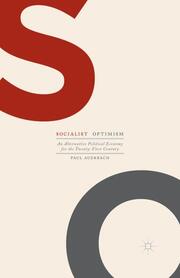Detailansicht
Socialist Optimism
An Alternative Political Economy for the Twenty-First Century
ISBN/EAN: 9781137563958
Umbreit-Nr.: 9163116
Sprache:
Englisch
Umfang: x, 522 S.
Format in cm:
Einband:
kartoniertes Buch
Erschienen am 08.03.2016
Auflage: 1/2016
- Zusatztext
- Socialist Optimism offers an alternative political economy for the twenty-first century - a rigorous, detailed blueprint focused upon the education and upbringing of children in the context of social equality and household security. It gives a unity and direction to progressive policies that are otherwise seen to be a form of pragmatic tinkering.
- Kurztext
- Paul Auerbach's Socialist Optimism offers an alternative political economy for the twenty-first century. Present-day capitalism has generated growing inequality of income and wealth, persistent high levels of unemployment and ever-diminishing prospects for young people. But in the absence of a positive vision of how society and the economy might develop in the future, the present trajectory of capitalism will never be derailed, no matter how acute the critique of present-day developments. The detailed blueprint presented here focuses upon the education and upbringing of children in the context of social equality and household security. It yields a well-defined path to human development and liberation, as well as democratic control of working life and public affairs. Socialism as human development gives a unity and direction to progressive policies that are otherwise seen to be a form of pragmatic tinkering in the context of a pervasive capitalist reality.
- Autorenportrait
- Paul Auerbach received his PhD from the University of Wisconsin, USA, and has been Reader in Economics at Kingston University, UK, since 1990. He has published work in academic journals such as the Journal of Economic Surveys and the Journal of Economic Issues as well as the New Left Review, and is the author of Competition: The Economics of Industrial Change (1988). His research interests include the measurement of economic growth, the economics of competition, and the relationship between education and economic development.
